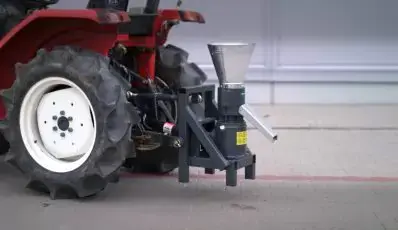Growing plants can be both a pleasant and useful pastime, and a great opportunity to feel closer to nature. If you look after plants well they will reward you with their beauty, and in many cases, also with abundant crops. However, in order to be able to enjoy the benefits of growing plants you need to properly look after them during their growth. Proper plant growth depends on many factors, about which you can easily gain the necessary knowledge. Read our guide to find out more on this topic.

Growing plants can be both a pleasant and useful pastime, and a great opportunity to feel closer to nature. If you look after plants well they will reward you with their beauty, and in many cases, also with abundant crops. However, in order to be able to enjoy the benefits of growing plants you need to properly look after them during their growth. Proper plant growth depends on many factors, about which you can easily gain the necessary knowledge. Read our guide to find out more on this topic.
Factors influencing the healthy growth of plants
First of all, there are two main groups of factors influencing proper plant growth. The first are so-called endogenous factors, in which plant hormones, also known as growth regulators, play a significant role. They contain the genetic information that regulates the processes taking place in plant cells. Plants utilise simple chemicals as hormones, which move more easily through their tissues.
Endogenous factors include, among others, auxins, which positively influence cell enlargement, bud formation and root initiation. In addition, they also cause the cells to differentiate. Auxins are formed in the leaves, from where they move to the base of the leaf, inhibiting the formation of the cuticle layer.
The second plant hormone worth knowing about are gibberellins. They stimulate seed development, as well as stem and bud growth. They also regulate germination. Gibberellins are synthesised in the very tops of shoots and roots and are present in seeds and fruits. Fruit also produces ethylene, which is responsible for their ripening and leaf fall.
While on the topic of endogenous factors, abscisic acid should also be mentioned, as it is responsible for inhibiting the excessive growth of plants, thus ensuring their proper development. Abscisic acid is also responsible for the formation of the cuticle layer.
The second group of factors that influence plant growth and development are exogenous, i.e. external factors. These do not depend in any way on the plant, but greatly influence its growth. These are the soil pH, temperature, light and salinity. These factors work together, and a deficiency of any of them will result in a significant reduction in the proper growth of the plant.
Effect of soil pH on plant growth
The pH, apart from its mechanical composition and humus, is the basic determinant of soil fertility. It not only impacts the rate of its mineralisation processes, but also the activity of microorganisms. As a result, both the effectiveness of applied fertilisers and the availability of all kinds of nutrients necessary for plants depend on the pH.
Acidic soils significantly reduce the activity of bacteria and actinomycetes, but enhance fungi growth. These, in turn, can secrete metabolites that are toxic to plants. The pH of the soil in which you want to grow your plants should therefore be checked as carefully as possible to ensure that it is not too acidic.
The vast majority of plants grow best in soil with a pH of 5.5-6.5, i.e. slightly acidic. Of course, there are some that feel best in acidic or alkaline soils. For this reason, it would be good to understand exactly what the ideal pH will be for a particular plant. Failing to do so could leave you with poor quality crops.
Moreover, the water used for irrigation of your plants should also have the right pH value. After some time, the soil will take on the pH of the water.
-
LED Grow Light- 600 W – 3,000 lumens
129.00 €109.00 € -
LED Grow Light – hanging – UV light – 1,200 W / 5,600 lm 179.00 €
-
LED Grow Light – 1,000 W – 5,400 lumens 139.00 €
-
LED Aquarium Light – 33 LEDs – 6 W – 27 cm 55.00 €
Influence of temperature on plant growth and development
The second exogenous factor necessary for the development and growth of plants is the ambient temperature. It influences the physiological reactions of the flora. Each plant has its own thermal optimum, i.e. a temperature range in which it thrives best. When it comes to our climate zone, this is usually somewhere in the range of 20-30 degrees Celsius. Of course, you can also find plants with seed germination at lower ambient temperatures. In this case this process is called vernalisation.
Effect of light on plant growth
Another important factor influencing the proper growth of plants is light. This is needed for the process of photosynthesis to take place, i.e. the production of nutrients and organic matter using light energy. In addition, light also enhances flowering. Some plants need as much light as possible, but there are also some that hardly need any at all. This is valuable knowledge when planting crops in your garden.
The influence of salinity on proper plant growth
Another important exogenous factor is the salinity of the water. Salt itself and the minerals it contains are the essence of life on our planet. For plants, both water and mineral salts are very important, because they not only enhance the production of many nutrients, but are also a substrate for reactions taking place in cells and they transport minerals to each part of the plant. In addition, they allow for evaporation, letting plants get rid of harmful excess heat.
How to boost plant growth
We have already covered the factors influencing the healthy growth of plants, so it’s now time to find out now how to put this knowledge into practice. Start with irrigation, using water with the correct pH. Make sure you also apply the right amount of water, so as not to drown or dry out the plant. Therefore, you should know how much water your specific plant really needs before you do this.
A good way to boost the growth of your plants is to nourish them with the right fertilisers. You can easily find various types of natural and artificial nutrients in every garden shop, necessary to enhance the growth of a specific plant. However, remember to apply the right amounts, following the recommendations given on the label. Fertilisers will not be much help if you use too much.
If you keep your plants indoors, and they require light, artificial light can also be used. For this you will need a special lamp for growing plants. This solution is also good if you want to provide the plant with a higher ambient temperature. One of the functions of this type of lamp is also to emit heat. However, remember to adjust the strength according to the plant’s requirements.
Proper plant growth – summary
When growing plants, you need to properly understand their needs. Providing appropriate vegetation conditions is key in order to enjoy healthy crops. While the endogenous factors – resulting from the genetic characteristics of a given plant – do not depend on us, you can definitely influence the exogenous factors that influence proper plant growth. Remember about the right soil pH, access to light, salinity and the right temperature. You can also enhance the process using solutions such as fertilisers, nutrients or plant growth lamps.






Share